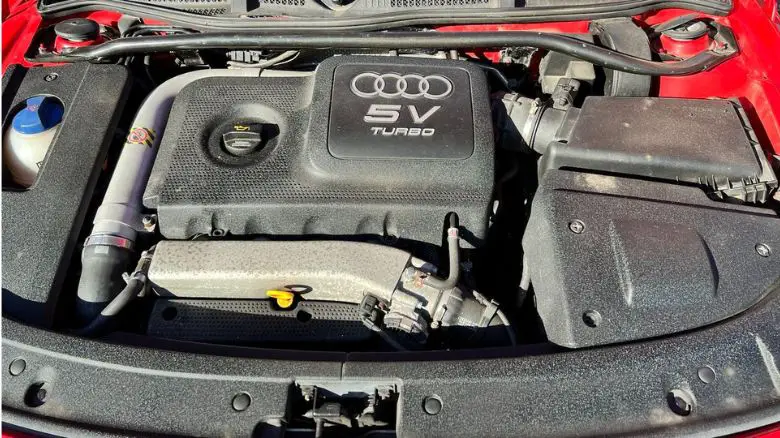Can an Audi Be Serviced Anywhere?

Adam
Founder, The Car Investor
If you're an Audi owner, you may be wondering if you can have your car serviced anywhere. Or, maybe you're considering buying an Audi and want to know what the service options are.
As Audi owners ourselves we're certainly interested in this topic, and we're always keen to get the best deal on Audi servicing!
So, can an Audi be serviced anywhere?
An Audi can be serviced anywhere, but it's best to find a garage that specializes in Audis. Servicing is cheaper at an independent garage than an Audi dealership, but the dealership does offer additional benefits.
We'll compare servicing an Audi at an independent Audi specialist vs. at an Audi dealership. We'll look at what's included in a service, and tell you about our experience with Audi specialists.
How Often do Audis get Serviced?
Audi follows a flexible service regime based on both time and mileage intervals, with recommendations varying slightly depending on driving conditions and engine type.
The standard service interval for most modern Audis is every 10,000 miles or 12 months, whichever occurs first.
However, this can be adjusted based on your driving patterns, with Audi's onboard computer monitoring oil quality and engine conditions to provide more precise service timing recommendations.
The service schedule alternates between minor and major services, creating a pattern that addresses different maintenance needs at appropriate intervals.
Minor services typically focus on essential checks and fluid top-ups, while major services include more comprehensive inspections and component replacements.
Understanding Audi's Service Types
Minor Services (10,000-mile intervals): These services concentrate on essential maintenance items including engine oil and filter changes, basic safety checks, tire pressure monitoring, fluid level inspections, and diagnostic scans. The minor service ensures your Audi continues running safely between more comprehensive maintenance sessions.
Major Services (20,000-mile intervals): Comprehensive services include everything from the minor service plus extensive system checks, brake inspections, suspension analysis, exhaust system evaluation, air filter replacement, and more detailed diagnostic procedures. These services catch potential issues before they become costly problems.
Additional Maintenance Milestones
Certain mileage intervals require additional attention beyond the standard minor/major service pattern. The 40,000-mile service represents a significant maintenance milestone where several wear items typically need attention, including spark plug replacement, transmission fluid service, brake fluid changes, and potentially timing belt replacement on applicable models.

High-mileage services at 60,000, 80,000, and 100,000+ miles often include major component inspections and replacements. These might encompass water pump replacement, timing belt or chain service, major fluid changes, suspension component inspection, and comprehensive electrical system diagnostics.
Factors Affecting Service Intervals
Driving Conditions: Severe service conditions - including frequent short trips, stop-and-go traffic, extreme temperatures, or dusty environments - may require more frequent servicing than standard intervals suggest.
Performance Models: S-line and RS models typically require more frequent attention due to higher-stress components and performance-oriented systems that operate under greater demands.
Vehicle Age: Older Audis may benefit from more frequent inspections as rubber seals, gaskets, and other components age and become more prone to failure.
Is it Expensive to Service an Audi?
Advertisement
Audi servicing costs reflect the brand's position as a premium manufacturer, with maintenance expenses typically running 30-40% higher than mainstream brands. According to RepairPal data, Audi owners can expect to pay approximately $900-1,200 annually for routine maintenance and repairs, which is $335 more than the average vehicle.
Cost Breakdown Analysis
Minor Service Costs: A basic minor service at an Audi dealership typically ranges from $250-400, depending on your location and specific model requirements. This includes synthetic oil changes, filter replacements, and basic inspections using genuine Audi parts and specialized diagnostic equipment.
Major Service Costs: Comprehensive major services can range from $500-800 or more, particularly when additional maintenance items coincide with the service interval. The 40,000-mile service, which often includes spark plugs, transmission service, and additional inspections, frequently costs $600-1,000.
Premium Component Costs: Several factors contribute to higher Audi servicing costs:
Synthetic Oil Requirements: Most Audi engines require fully synthetic oil, which costs significantly more than conventional alternatives but provides superior protection and longer intervals between changes.
Genuine Parts Premium: OEM Audi parts command premium prices due to engineering specifications and quality standards, but provide optimal fit, performance, and longevity.
Specialized Equipment: Audi's sophisticated electronic systems require expensive diagnostic equipment and software that not all service facilities possess.
Technician Training: Certified Audi technicians undergo extensive training programs, and this expertise is reflected in labor rates.
Comparative Context
While Audi servicing costs appear high in isolation, they're actually competitive within the luxury segment.
BMW and Mercedes-Benz owners face similar annual maintenance costs, and when compared to exotic brands or high-performance vehicles, Audi maintenance represents reasonable value.
The key to managing Audi servicing costs lies in preventive maintenance and choosing the right service provider for your specific needs and budget constraints.
Should I get my Audi serviced at an Audi Dealership?
Audi dealerships offer several compelling advantages that justify their premium pricing for many owners, particularly those with newer vehicles or complex issues requiring specialized attention.

Dealership Advantages
Factory-Trained Expertise: Audi dealership technicians receive ongoing training directly from the manufacturer, ensuring they stay current with the latest diagnostic procedures, technical service bulletins, and repair techniques. This expertise is particularly valuable for newer models or complex electronic systems.
Cutting-Edge Diagnostic Equipment: Dealerships invest in the latest Audi-specific diagnostic tools and software, including factory scan tools that can access systems and perform procedures unavailable to independent shops. This equipment advantage is crucial for modern Audis with sophisticated electronic architectures.
Genuine Parts Guarantee: Dealerships exclusively use genuine Audi parts, ensuring perfect compatibility and maintaining any existing warranties. These parts come with Audi's backing and often include updated designs that address known issues from earlier production runs.
Warranty Considerations: For vehicles still under manufacturer warranty, dealership servicing ensures coverage remains intact. Warranty work performed at dealerships is typically handled seamlessly without additional cost to the owner.
Comprehensive Service Experience: Many dealerships provide additional conveniences including courtesy vehicles, comfortable waiting areas, detailed service explanations, and comprehensive vehicle health reports that help owners understand their car's condition.
Dealership Disadvantages
Premium Pricing: Dealership labor rates are typically 20-40% higher than independent specialists, and parts markup can be substantial. A routine oil change costing $120-150 at an independent shop might cost $180-220 at a dealership.
Scheduling Challenges: Popular dealerships often have extended booking times, making it difficult to secure appointments for routine maintenance. This can be particularly frustrating for time-sensitive repairs.
Less Personal Service: Large dealerships may feel impersonal compared to independent specialists who develop long-term relationships with customers and their specific vehicles.
Unnecessary Upselling: Some dealerships aggressively promote additional services or repairs that may not be immediately necessary, potentially inflating service costs.
Are there any risks associated with servicing an Audi at an independent specialist?
Advertisement
Choosing the right independent specialist can provide excellent service at competitive prices, but selecting the wrong facility can lead to problems that ultimately cost more than dealership servicing would have.
Potential Risks and Mitigation Strategies
Warranty Concerns: While the Magnuson-Moss Warranty Act protects consumers' right to choose service providers, warranty claims can become complicated if independent service is performed incorrectly. For vehicles under warranty, maintain detailed service records and ensure any independent shop uses OEM-equivalent parts and follows Audi service procedures.
Technical Expertise Gaps: Not all independent shops have the specialized knowledge required for Audi's complex systems. Look for facilities that specifically advertise Audi expertise, employ ASE-certified technicians with German car experience, or have former dealership technicians on staff.
Diagnostic Equipment Limitations: Some independent shops may lack the latest Audi-specific diagnostic tools, potentially leading to misdiagnosis or incomplete repairs. Ask potential service providers about their diagnostic capabilities and whether they can perform all necessary procedures for your specific model.
Parts Quality Variables: Independent shops may offer aftermarket parts as cost-saving alternatives, but quality can vary significantly. Establish clear expectations about parts quality and ensure any substitutions meet or exceed OEM specifications.

Benefits of Quality Independent Specialists
Personalized Service: Independent specialists often provide more personalized attention, developing familiarity with your specific vehicle and maintenance history. This relationship can lead to better preventive care and early problem detection.
Competitive Pricing: Labor rates at independent specialists are typically 15-30% lower than dealerships, and parts markup may be more reasonable. Many independent shops also offer package deals or loyalty discounts for regular customers.
Flexibility and Convenience: Independent shops often offer more flexible scheduling, faster turnaround times, and willingness to work with customers on timing and budgeting for major repairs.
Specialized Expertise: Many independent Audi specialists focus exclusively on German vehicles, often developing expertise that rivals or exceeds dealership knowledge in specific areas.
Finding the Right Independent Specialist
Research and Referrals: Seek recommendations from other Audi owners, online forums, and local car clubs. Look for shops with strong online reviews and Better Business Bureau ratings.
Certification and Training: Verify that technicians hold relevant certifications (ASE, manufacturer training certificates) and that the shop invests in ongoing education and equipment updates.
Facility Tour: Visit potential service providers to assess their cleanliness, organization, and equipment quality. Well-maintained facilities typically correlate with quality work.
Clear Communication: Choose shops that provide detailed estimates, explain recommended work clearly, and maintain open communication throughout the service process.
How else can you save money on Audi servicing?
Beyond choosing between dealership and independent service, several strategies can significantly reduce your Audi maintenance costs without compromising quality or reliability.
DIY Maintenance Opportunities
Basic Fluid Maintenance: Simple tasks like checking and topping off fluids (oil, coolant, washer fluid, brake fluid) can be performed by most owners with basic tools and knowledge. Regular monitoring helps catch problems early and ensures optimal performance between services.
Air Filter Replacement: Engine and cabin air filters are typically easy to replace and cost significantly less when purchased independently versus having them replaced during service. These filters should be checked regularly and replaced when dirty or clogged.
Basic Inspections: Learning to perform visual inspections of belts, hoses, tires, and lights helps identify developing problems before they require expensive repairs. Early detection often means less costly solutions.
Tire Maintenance: Proper tire pressure maintenance, rotation, and alignment checks can extend tire life significantly and improve fuel economy. These tasks are either free (pressure checks) or much less expensive when performed independently.
Strategic Service Planning
Preventive Maintenance Priority: Addressing wear items before they fail prevents cascading damage that can multiply repair costs. For example, replacing a worn timing belt costs much less than rebuilding an engine after belt failure.
Service Bundling: Combining multiple maintenance items during a single service visit reduces labor overlap and can result in package pricing discounts.
Seasonal Planning: Scheduling major services during slower periods (spring/fall) may result in better pricing and faster turnaround times.
Parts Shopping: For major repairs, consider purchasing parts independently and having your service provider install them. This strategy works best with trusted shops willing to warranty their labor on customer-supplied parts.
Long-Term Cost Management
Maintenance Fund: Setting aside $75-100 monthly for Audi maintenance creates a dedicated fund that makes large service bills more manageable and enables proactive maintenance scheduling.
Service History Documentation: Maintaining detailed records helps optimize service intervals, provides valuable information for diagnostics, and supports resale value.
Quality Investment: Using high-quality oils, filters, and parts may cost more initially but often extends service intervals and reduces long-term maintenance costs.
Audi servicing – our experience
Advertisement
Our nearly two decades of Audi TT ownership have provided extensive real-world experience with various servicing approaches, offering valuable insights into the practical realities of Audi maintenance.
Finding the Right Service Partner
After initially using the dealership for warranty service, we transitioned to an independent specialist when our TT's warranty expired. The key was finding a former Audi technician who had established his own shop specializing in German vehicles. This transition provided several immediate benefits:
Cost Savings: Our independent specialist charges approximately 25% less for labor and offers more competitive parts pricing. Over our ownership period, we estimate savings of $1,200-1,500 compared to continued dealership servicing.
Personal Relationship: Working with the same technician who becomes familiar with our specific vehicle's history and quirks has resulted in more targeted maintenance and early problem detection.
Flexible Scheduling: Our independent specialist offers much more flexible appointment scheduling and often accommodates urgent needs that would require days or weeks at a dealership.
Transparent Communication: We receive detailed explanations of recommended work, honest assessments of urgency, and no pressure for unnecessary services.

Service Quality Comparison
Contrary to concerns about independent service quality, we've found our specialist's work to be equal to or better than our dealership experience.
The technician's focused expertise with Audi and other German brands, combined with investment in proper diagnostic equipment, has resulted in accurate diagnoses and effective repairs.
The independent shop's willingness to source high-quality aftermarket alternatives for non-critical components has provided additional cost savings without compromising reliability.
For critical components, they continue to use genuine Audi parts when specified.
Lessons Learned
Research Pays Off: Investing time in finding the right service provider yields long-term benefits in cost savings, service quality, and peace of mind.
Relationship Building: Developing a long-term relationship with a trusted service provider results in better care and often preferential treatment for scheduling and pricing.
Proactive Maintenance: Following our specialist's recommendations for preventive maintenance has helped us avoid several potentially expensive problems.
Documentation Importance: Maintaining detailed service records has proven valuable for warranty claims, diagnostics, and eventual resale.
The verdict – can an Audi be serviced anywhere?
The question of where to service your Audi doesn't have a one-size-fits-all answer, but depends on your specific circumstances, priorities, and vehicle characteristics.
Decision Framework
For Newer Audis (Under Warranty): Dealership servicing often makes the most sense to ensure warranty coverage remains intact and to take advantage of any recalls or technical service bulletins.
The premium cost is often justified by warranty protection and the latest technical knowledge.
For Older Audis (Out of Warranty): Independent specialists typically offer the best value proposition, combining cost savings with specialized expertise. The key is finding a reputable shop with proven Audi experience.
For Complex Issues: Regardless of your vehicle's age, complex electronic problems or unusual symptoms may require dealership-level diagnostic equipment and expertise.
For Routine Maintenance: Well-established independent specialists can handle routine maintenance as effectively as dealerships at significant cost savings.
Quality Independent Specialist Characteristics
Former dealership technicians or factory-trained personnel
Investment in Audi-specific diagnostic equipment
Positive reputation within the local Audi community
Willingness to use genuine parts when specified
Clear communication and transparent pricing
Detailed service documentation
Final Recommendations
Research Thoroughly: Whether choosing a dealership or independent specialist, research their reputation, certifications, and customer feedback.
Start Small: Begin with minor services to evaluate quality and communication before trusting major repairs to a new service provider.
Maintain Records: Document all service work regardless of where it's performed to support future diagnostics and resale value.
Budget Appropriately: Audi ownership requires higher maintenance costs than mainstream brands, regardless of where service is performed.
Stay Proactive: Regular maintenance and early problem detection reduce long-term costs and improve reliability.
The bottom line is that Audis can indeed be serviced anywhere, but success depends on choosing the right facility with appropriate expertise, equipment, and commitment to quality.
For most owners, a reputable independent Audi specialist provides the optimal balance of cost savings, expertise, and service quality.
Our experience demonstrates that with proper research and selection, independent servicing can provide equal or superior results at significant cost savings compared to dealership service.
The key is making an informed choice based on your specific needs, budget, and priorities rather than assuming that higher cost automatically means better service.
No spam. We'll only email you when it matters.

About the Author
Adam is the founder of The Car Investor, combining his passion for classic cars with data-driven investment strategies to help collectors maximize their returns.
View all articles →Related Articles

How to Learn to Work on Cars: 8 Simple Steps
Plenty of people dream of being able to fix their own car. There’s something about the inner-workings of a vehicle that just fascinates people. Learning to work on your own car can be a great way to save money, and it can also be a fun hobby.

Is Driving Fast Bad For Your Car?
Driving fast is bad for the engine, drivetrain, suspension and various other components of a car as it causes them to wear more quickly. However, modern cars are built to tolerate speeds much higher than are legal on any public road.

Are Jaguars Good Cars? (And Are They Worth The Money?)
Jaguars are some of the most exceptional high-quality cars around. Their reputation for reliability is improving, their looks are magnificent, and their performance is sublime. Jaguar has a long history of producing great cars, and is continuing to innovate as we move into the electric vehicle era.
Advertisement